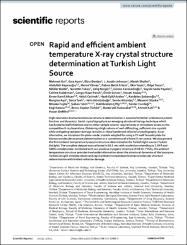Rapid and efficient ambient temperature X-ray crystal structure determination at Turkish Light Source

View/
Access
info:eu-repo/semantics/openAccessDate
2023Author
Gul, MehmetAyan, Esra
Destan, Ebru
Johnson, J. Austin
Shafiei, Alaleh
Kepceoğlu, Abdullah
Yilmaz, Merve
Ertem, Fatma Betül
Yapici, İlkin
Tosun, Bilge
Baldir, Nilüfer
Tokay, Nurettin
Arslan, Nazlı Eylül
Metadata
Show full item recordCitation
Tseng, P. T., Cheng, Y. S., Yen, C. F., Chen, Y. W., Stubbs, B., Whiteley, P., ... & Lin, P. Y. (2018). Peripheral iron levels in children with attention-deficit hyperactivity disorder: a systematic review and meta-analysis. Scientific reports, 8(1), 1-11.Abstract
High-resolution biomacromolecular structure determination is essential to better understand protein function and dynamics. Serial crystallography is an emerging structural biology technique which has fundamental limitations due to either sample volume requirements or immediate access to the competitive X-ray beamtime. Obtaining a high volume of well-diffracting, sufficient-size crystals while mitigating radiation damage remains a critical bottleneck of serial crystallography. As an alternative, we introduce the plate-reader module adapted for using a 72-well Terasaki plate for biomacromolecule structure determination at a convenience of a home X-ray source. We also present the first ambient temperature lysozyme structure determined at the Turkish light source (Turkish DeLight). The complete dataset was collected in 18.5 min with resolution extending to 2.39 Å and 100% completeness. Combined with our previous cryogenic structure (PDB ID: 7Y6A), the ambient temperature structure provides invaluable information about the structural dynamics of the lysozyme. Turkish DeLight provides robust and rapid ambient temperature biomacromolecular structure determination with limited radiation damage. © 2023, The Author(s).

















